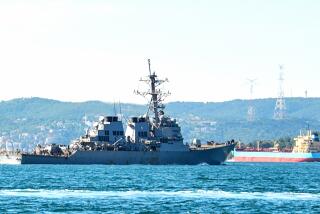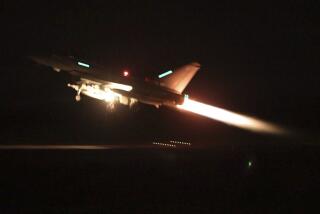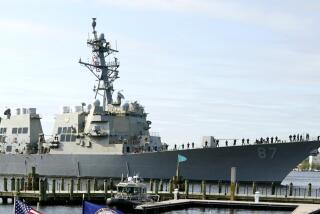The Point Is Made
- Share via
The right of international passage affects every maritime nation, and the United States has been right in affirming that principle wherever it has been challenged. So there was good reason for American warships once again to sail in recent days off the Black Sea shore of the Soviet Union and to enter the Gulf of Sidra north of Libya.
There were diplomatic protests from Moscow, but no interference with ships passing through the Black Sea. But Col. Moammar Kadafi, the Libyan leader, was not content with his claim of sovereignty over the high seas and unleashed, so it is reported, six missiles--presumably targeted against U.S. warplanes and Navy ships challenging his claim. That act of aggression invited retaliation.
The American response, as announced at the White House and the Pentagon, appeared to be measured and appropriate, striking at two missile warships apparently moving toward the 6th Fleet, and also striking at the land-based missile battery from which at least some of the weapons used against American targets had been fired.
In those elements of the conflict there appear to be broad issues of international law, of right and wrong, that give support in principle to what the United States was affirming and that discredit Kadafi’s resort to violence.
The judgment of the world may be colored, however, by the very scale of the action that the United States undertook in the Mediterranean. It may indeed be, as the White House insisted, that no provocation was intended, that the motives involved were entirely innocent and based solely on concern about the right of passage in what are almost universally regarded as international waters.
Whatever the case, sending an assembly of three carriers, with about 270 fighting aircraft, in a flotilla of 27 vessels indicated that the United States did not rule out the possibility that Kadafi would react with violence, and that it wanted a fleet big enough to handle anything. If nothing else, such a concentration elevates the importance of Kadafi when most of his Arab neighbors, and virtually all allies of the United States, think that he would be better tamed by some simple quarantine.
The sudden escalation from confrontation to battle underscores the importance of action now to end the hostilities quickly, permanently, lest they spark a broader conflagration. The violence measures the volatility of the Libyan leader. The United States can demonstrate, in the way it restores peace, its respect of a world ruled by law.
More to Read
Sign up for Essential California
The most important California stories and recommendations in your inbox every morning.
You may occasionally receive promotional content from the Los Angeles Times.










